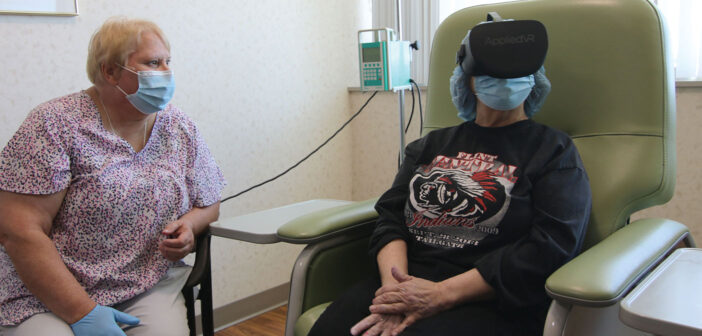If you were given a choice between spending a few hours in a cancer treatment clinic or on a sunny beach, you’d choose the beach, right? Thanks to virtual reality headsets, patients at Genesys Hurley Cancer Institute (GHCI) are benefiting from technology that allows them to take a mini-vacation while receiving treatment.
Now in use at GHCI, VR headsets help cancer patients “travel” to a favorite peaceful destination during their chemotherapy treatments, helping relieve anxiety, apprehension, depression and pain, and reducing side effects such as fatigue. After their virtual reality experience, patients reportedly feel more energized.
Research shows and patients have confirmed that the use of virtual reality headsets is improving their in-clinic experience. A pilot study on the VR program documents overwhelmingly positive comments from patients. All participants said they enjoyed the experience, 98 percent reported it was relaxing, and 64 percent said it reduced their anxiety and boredom.
“We are helping remove patients from the reality of their treatment and taking them to a place of peacefulness.”
Sue Root, GHCI Quality of Life Director
“Our virtual reality headsets are a way for patients to transport themselves to a place of happiness, peacefulness and relaxation,” finds Sue Root, GHCI Quality of Life Director, who was instrumental in obtaining the funds needed to offer this service to patients.
“Patients are worried and anxious about their chemotherapy. ‘What is going to happen? Will I be in pain? Will the treatments work? How long do I need to stay connected to an IV line?’ During their therapy, the minutes seem to drag on and on, and so can their added stress,” Root notes. Studies show that the immersive experience of virtual reality alters the perception of time, making the treatment sessions seem shorter.
“If we can provide a positive, relaxing distraction, an escape from their life of cancer, patients will feel much better and more comfortable about their treatments and leave the clinic feeling much happier,” she finds. “We are helping remove them from the reality of their treatment and taking them to a place of peacefulness.
“You can tell someone how to meditate and imagine they are in a place of calmness, but during a chemotherapy session, that is almost impossible with all of the surrounding distractions,” Root finds. “Through our virtual reality headsets, patients can see the visuals and hear the sounds of comfort, making it so much easier to find that place of peace.”
The individual VR headsets are hands-free and simple to use. Patients can choose from 36 different experiences – life on a beach in Cape Cod, Irish landscapes, swimming with aquatic life or listening to and watching the gentle, soothing sounds of ocean waves. They also can tune into general educational information about their cancer, treatments, side effects and what to expect as a cancer patient – information they received from their physician offered visually and in easier-to-understand terms that they can listen to as often as they want. The GHCI staff shows patients how the headsets work and guides them through the process of finding programs they want to watch. Programs run from five to ten minutes in length.
Virtual reality is feasible to use as a distraction intervention during chemo treatments and is well-accepted by patients.The headsets are available to any patient undergoing chemotherapy but are not recommended for patients who have issues with dizziness, vertigo or motion sickness.
Genesys Hurley Cancer Institute provides the newest treatments and technology in a warm, welcoming, home-like setting. For more information, visit ghci.org.
GHCI Quality of Life Director, Sue Root (left), helps a patient navigate the VR headset.
baivector / stock.adobe.com Alexander Ozerov / stock.adobe.com








